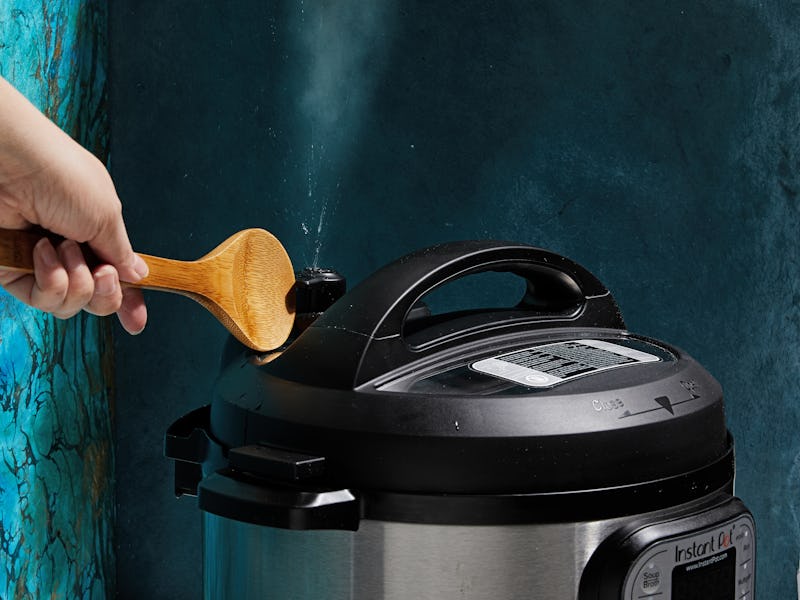Engineers find a unique use for Instant Pots during Covid-19

Masks are increasingly seen as the deciding factor in fighting back against the Covid-19 pandemic. Robert Redfield, director of the Centers for Disease Control and Prevention, has said that the pandemic could end in America in four to eight weeks “if only “we could get everybody to wear a mask right now.” But it’s not just wearing a mask. You’ve got to clean them too.
Just like your other clothes, a mask needs to be regularly cleaned. Scientists believe that germs and pathogens can last on masks for 8-12 hours, and medical groups like the Society of American Gastrointestinal and Endoscopic Surgeons offer best practices for decontaminating masks during a shortage.
Now, a new study suggests that a cleaning method might be found in your kitchen in the form of an Instant Pot, or rice cooker.
A study by the University of Illinois, published last month in the journal Environmental Science & Technology Letters, shows that one cooking cycle in an electric cooker, 50 minutes of dry heat, can thoroughly and effectively decontaminate an N95 mask.
Vishal Verma, an Assistant Professor in the Urbana-Champaign Department of Civil & Environmental Engineering, says in a press statement the electric cooker might offer a solution easier on a number of levels than what’s currently available.
"There are many different ways to sterilize something, but most of them will destroy the filtration or the fit of an N95 respirator. Any sanitation method would need to decontaminate all surfaces of the respirator, but equally important is maintaining the filtration efficacy and the fit of the respirator to the face of the wearer. Otherwise, it will not offer the right protection," he says.
An electric cooker could check all the boxes.
Looking for a convenient solution to the problem of cleaning N95 masks, researchers gravitated towards a dry heat. Considering the high demand for masks, and the potential chaos at a hospital where shortages can emerge, they wanted a cleaning system with no special preparation and no chemical residue. Something quick and easy, with the added benefit of being accessible.
Verma and colleague Thanh "Helen" Nguyen decided that an electric cooker could check all the boxes. A preliminary test confirmed their suspicions—the electric cooker was able to decontaminate the masks on both sides from four different classes of virus, including a type of coronavirus. It was able to do so at a greater rate of efficiency than ultraviolet light.
Then came more extensive testing, with similarly positive results.
"We built a chamber in my aerosol-testing lab specifically to look at the filtration of the N95 respirators, and measured particles going through it. The respirators maintained their filtration capacity of more than 95% and kept their fit, still properly seated on the wearer's face, even after 20 cycles of decontamination in the electric cooker," Verma says.
Like any use of an electric cooker, decontaminating a mask in one has its one rules and regulations. A dry heat is crucial—no water whatsoever in the pot. Keep the pot at a steady temperature of 100 degrees Celsius for 50 minutes, and place a small towel at the bottom of the pot to keep the masks from interacting with any of the extremely heating elements of the pot.
But with those regulations in place, Verma and Ngyuen say that the electric cookers that dot kitchens in America could find new uses in hospitals filled with Covid-19 patients, and could help people at home keep their masks as clean as possible.
Abstract: A pandemic such as Covid-19 can cause a sudden depletion of the worldwide supply of respirators, forcing healthcare providers to reuse them. In this study, we systematically evaluated dry heat treatment as a viable option for the safe decontamination of N95 respirators (1860, 3M) before their reuse. We found that the dry heat generated by an electric cooker (100 °C, 5% relative humidity, 50 min) effectively inactivated Tulane virus (TV, >5.2-log10 reduction), rotavirus (RV, >6.6-log10 reduction), adenovirus (AdV, >4.0-log10 reduction), and transmissible gastroenteritis virus (TGEV, >4.7-log10 reduction). The respirator integrity (determined on the basis of the particle filtration efficiency and quantitative fit testing) was not compromised after 20 cycles of a 50 min dry heat treatment. On the basis of these results, dry heat decontamination generated by an electric cooker (e.g., rice cookers, instant pots, and ovens) could be an effective and accessible decontamination method for the safe reuse of N95 respirators. We recommend users measure the temperature during decontamination to ensure the respirator temperature can be maintained at 100 °C for 50 min.
This article was originally published on